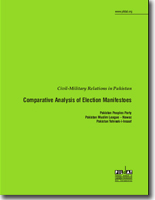Throughout Pakistan’s history, and persistent even today, there has been a serious debate about whether the ultimate responsibility for the failure or derailing of democracy lies with the military by taking over the country’s reins so frequently on one pretext or another or with political parties which did not follow democratic principles or traditions 1 whenever they got a chance to rule, nor provided good governance. Imbalances in civil-military relations affect the political class as a whole, but what have political parties of Pakistan learnt from successive military interventions? Organised political parties serve as engines of democratic consolidation in a country and while institutionalisation of parties is desirable for improving the quality of democracy in Pakistan, where do these parties stand in terms of organised thought on dealing with the most crucial issue in sustainability of democracy today? This paper examines Election Manifestoes of 3 political parties mainly the Pakistan Peoples Party (PPP); Pakistan Muslim League–Nawaz (PML-N) and Pakistan Tehreek-e-Insaf (PTI). Election Manifestoes of 2002 and 2007, preceding General Elections 2002 and 2008 respectively have been examined in this study, in addition to the Charter of Democracy, signed between the two former Prime Ministers of Pakistan Mohtarma Benazir Bhutto, Chairperson of PPP and Mr. Muhammad Nawaz Sharif, Leader of PML-N in May 2006. The study of the two successive manifestoes is undertaken so as to trace the development, or lack thereof, of a party’s vision on correcting the civil-military imbalances in Pakistan.
Comparative Analysis of Election Manifestoes
Civil-Military Relations in Pakistan







